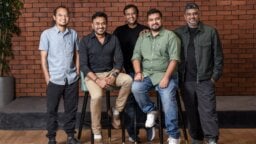Cameron Strang is one of the most powerful music executives on the planet.
If you want to know how much Warner Music Group owner Len Blavatnik and CEO Stephen Cooper think of him, you merely need to regard this fact: he’s the only person in the entire business to simultaneously run both a frontline major record label and a leading music publisher – Warner Bros Records and Warner/Chappell.
Before Strang became one of Warner Music Group’s most important employees, he was a thoroughbred independent – founding both New West Records in 1998 and then Southside Independent Publishing in 2004.
The exec became part of the Warner Music Group in 2010, when then-Chairman Edgar Bronfman Jr. acquired Southside – and Strang with it.
Bronfman immediately made Strang boss of Chappell, one of the most historic and powerful publishing operations in the world.
Within just six years, Southside had built a roster that included soon-to-be superstar Bruno Mars, producer Brody Brown, Nashville-based writers, Ashley Gorley and Blair Daly, Christian music star, Matthew West and Kings of Leon.
But Strang’s first taste of independent success came with his label, New West Records, which he created in the late nineties as a home ” for artists who perform real music for real people”.
Three years after launching New West, Strang and his label tasted Grammy success for the first time: in 2001, critically-acclaimed LP Nothing Personal by veteran rocket Delbert McClinton picked up Best Contemporary Blues Album.
Under Strang’s Guidance, New West also added records from the likes of Tim Easton, Stephen Bruton, Steve Earle, Kris Kristofferson, Drive By Truckers, Ben Lee and Julie Miller to its roster.
Today, Strang oversees two operations with a wealth of megastars and hotly-tipped new talent at the end of its tentacles from Jason Derulo, Michael Buble and Neil Young to Katy Perry, Tom Petty, Nile Rodgers and Drake.
In 2012, he poached his old friend, ‘Big’ Jon Platt, from EMI Publishing, to help run Warner/Chappell in North America.
Platt’s since brought in the likes of Jay Z, Beyonce and Aloe Blacc to the company.
It’s been quite a climb for Strang, a hockey-loving Canadian law graduate who studied at British Columbia University for six years in his family’s hometown of Vancouver.
One of five brothers, with an opera-loving father, Strang hasn’t benefitted from the helpful and all-too-common hand of music biz nepotism: he’s done it the hard way.
As he explained to a hushed audience at Canadian Music Week in Toronto on Saturday (May 9), his biggest career moments have taught him lessons than many a music exec could benefit from.
Here’s seven of the best…
1) don’t try and be too big, too soon
“New West Records was a great lesson for me. When I started the record company, I was the only employee for four years. I learned to do everything; make records, mix records, make the deals, all of that stuff.
“Slowly we built it to 22 or 25 employees. Our biggest years were selling $20m-$25m of music around the world. But it was all achieved through a slow building network of relationships.”
2) Be persistent… and remember: you never know who knows who
“I meant a fellow named Stephen Bruton at the Ironworks Barbecue at Austin, Texas. We started talking and it turned out he produced some records I really loved, including an album by Alejandro Escovedo, a great artist from Texas. I didn’t know much about [Stephen] but we became friends and I put out his own record.
“I’d seen Delbert McClinton open the Vancouver Jazz Festival years before in 1991. I was totally blown away. He he hadn’t made a record in a long time, so I cold-called his house in Nashville to try and sign him.
“God bless Delbert and his wife Wendy, who answered the phone at the time; they thought I was crazy, but they finally agreed to take a meeting. It turned out Delbert had grown up with Stephen Bruton.
“He later ran into Stephen, who said: ‘I met this kid at the Ironworks Barbecue – I’ve been making some music with him.’ And Delbert was like: ‘That kid’s been calling my house!’
“Delbert agreed to sign. We made a record, it won a Grammy and sold hundreds of thousands of copies.”
3) Change can hit you at any time
“Edgar Bronfman is one of the great executives in the history of the music business – he did it all such elegance and grace. I admire him greatly. He’s helped me a lot in my career.
“His office called my cell phone one day [in 2010] and said Edgar would like to meet with me somewhere private in Santa Monica. I was like: ‘Starbucks probably isn’t private enough… maybe my house?’
“So Edgar came over and we talked for three or four hours in the back yard. We didn’t talk specifically about publishing, my company or those kind of things – just business in general, life, how we saw artists and the music industry.
“At the end of it, he turned to me and said: ‘I’d like to buy your business and I’d like you to run Warner/Chappell.'”
4) Recognise those who can help you take things to the next level
“When I got the Warner/Chappell gig, it was fantastic and we were doing great. But I knew all about Jon Platt as a competitor and a colleague – and I knew in my heart that if he’d agree to come over and help me that we’d be unstoppable together.
“Jon’s one of the great executives in our business – not just publishing, the entire music business. He’s got an incredible work ethic, he’s a great leader and an incredible person. He’s something else. He’s larger than life.
“Together, we’ve gone from essentially – in terms of market share – fourth place of major publishers to first in 18 months.
“Sony bought EMI and No.2 and No.3 joined together to leapfrog us… but we don’t count that! We’re still No.1 as far as we’re concerned.
“We have 1.2m copyrights under management globally, we have offices everywhere you could imagine – including China, Singapore and all over Asia, plus every country in Europe and South America.”
5) Stay a fan
“Growing up, going to college and university, I didn’t know anything about the music business. I’m still a glorified music fan, really.
“I thought it was normal, but looking back on it, I guess not a lot of kids skip school in the 10th grade to take a greyhound bus to Seattle to see The Stones, then two months later go back to see The Who and The Clash.
“I spent a lot of our time fishing and all the things people tend to do on the West Coast, but then I also had a ’71 Volkswagen van, going back and forth to San Francisco, Seattle, San Diego to see concerts.
“I had two great passions at young age: hockey first of all, and then music. Music was always in me. I had no idea it would be a career.”
6) Accept help when you need it. You might be able to repay it later on
“I knew Mike Campbell, the guitar player from Tom Petty & The Heartbreakers, before I knew Tom.
“I was always astounded: when we had the independent record company, making records on no budget, we’d scour for old studios that would give us time for cheap [recordings] – we were doing it on a shoestring.
“Mike was open to that. I remember one time went to his house, he let us use his studio for a day and he even played a solo on the record for us.
“He’s a terrific guy, and Tom’s obviously an all-time great. I remember seeing him play in Vancouver when I was young.
“He really is a rebel. He doesn’t take shit from anybody.”
[Tom Petty & The Heartbreakers’ Hypnotic Eye became the band’s first album to top the Billboard 200 in 2014 on Warner Bros Records.]
7) Don’t be afraid of the future – but remember it’s not everything
“It’s easy to get lost in all of the noise in the music industry, but at the end of the day when you have courageous artists, songwriters and producers making incredible music, you’re going to be okay.
“That’s really the lifeblood of everything.
“Len Blavatnik is a great believer in change and pushing forward. He encourages us to take risks and try new things. We’re very fortunate to have long-term ownership from Len – he’s looking at long-term value.
“He encourages us to change the company. I’m incredibly fortunate to run a [business] that’s based in Los Angeles – Silicon Valley’s not far away. Although I don’t have to drive the Volkswagen van there anymore!
“We can go there anytime and meet the people – mainly young people – in tech who are going to bring this business forward in the future.
“But whatever the technology companies create, a lot of it runs on and relies on music. You have to embrace change – but you have to meet it half-way.”
[Pictured: Cameron Strang on stage with interviewer Ralph Simon at Canadian Music Week]Music Business Worldwide




